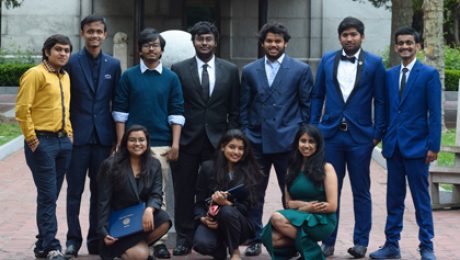How Interdisciplinary Education Hones Requisite Skills
How Interdisciplinary Education Hones Requisite Skills For Entrepreneurs
In their study ‘A Multidisciplinary Approach to Creating the Entrepreneurial Mindset Amongst Graduates’, Angela Hamouda and Colman Ledwith strongly recommend this modern “reform” in education. The Dundalk Institute of Technology scholars assert that while entrepreneurs recognise opportunities, skills from interdisciplinary learning allow them to conceive, design and build ideas. Both types of skills complement each other.
It is now well established that entrepreneurship is the backbone of growing economies. It’s particularly true of India, which is seen as a land of opportunities all over the world. For our economy to flourish, we need more entrepreneurs, who give rise to successful and sustainable businesses. But for that to happen, future entrepreneurs will need to call upon skills that they can gain only through interdisciplinary education.
What do experts say?
A European Commission report read, “Traditional educational methods do not correlate well with the development of entrepreneurial traits and attributes and that interdisciplinary collaboration is an essential element of building enterprising abilities.” That belief has been supported and propagated not only by leading academic and researchers all over the world but industry practitioners and entrepreneurs too.
According to noted historian and academic Dr Patrick French, students with interdisciplinary education including Liberal Arts are more adept to problem-solving. Other experts assert that it promotes lateral and innovative ways of thinking, which are crucial for professionals and entrepreneurs of tomorrow. There are examples galore of Tech companies hiring professionals with some Liberal Arts backgrounds. Others have followed suit.
Building vital skills for entrepreneurs
In an interdisciplinary setup, students are exposed to varied perspectives and schools of thought. That enables them to approach a business issue from different angles as they look for solutions. It thus organically enhances their problem-solving skills, which is a vital ability for future entrepreneurs. It’s also important to realise that entrepreneurs are captains of their ships and have to take decisions, where they benefit immensely through this approach.
One of the most underrated entrepreneurial skills is creativity. While being a visionary and the appetite for risks are skills that are often touted, you can’t lose sight of creative skills, which will come into play a lot more in the fast-evolving and versatile world of entrepreneurship. But arguably the most important lesson of the interdisciplinary approach comes through the understanding of and interacting with minds from diverse backgrounds.
Entrepreneurs at the helm of matters might not necessarily have to lead teams directly, but they realize the benefits of getting the best from their personnel for business. The interdisciplinary approach encourages students to transcend boundaries of discipline and engage with peers from different backgrounds. That along with the other crucial skills can make for successful entrepreneurs of tomorrow.
- Published in Blog, Management
7 CAREER OPTIONS AFTER A BACHELORS IN BUSINESS ADMINISTRATION
If you’ve been dreaming of auditioning your next big business idea on Shark tank since the age of 10 or can’t wait to dive into the world of management and entrepreneurship, a Bachelors in Business Administration (BBA) is the right course for you. Launched less than 30 years ago in India, a BBA was one of the first professional Bachelor’s degrees on the block, excepting the fields of engineering and medicine. Since then, the course has only grown in popularity, allowing you a chance to get a good job right after college. Before we explore what kind of jobs are available after a BBA, it is helpful to know what you’ll be studying in a well-designed BBA course.
What is a BBA?
Typically, a three-year long course, a BBA includes core modules in business studies, economics, marketing, and computer science. Since it a professional course, the BBA emphasises project work & practical, hands-on training in management, leadership skills, teamwork, and communication abilities. This is carried out through case studies, visits to work sites, and internships. The end goal of a BBA is to leave you career-ready for management, in case you don’t want immediately to pursue higher studies. Another question you may have is how to get a job after your BBA. Most good institutes offer campus placements, primarily if you have scored well in your course, so doing well in academics always helps. Even if your institute doesn’t offer placements, many Indian and multinational companies (MNCs) hold recruitment drives for entry-level managers, analysts, and researchers.
- Published in Blog, Management
10 career options after BCom
WHAT ARE MY CAREER OPTIONS AFTER A BACHELORS IN COMMERCE (B. COM)?
Bachelors in commerce is a greatly sought out-degree, particularly for those who want to pursue a career in the corporate sector. However, many people think the only way you can get there is with an MBA following your bachelor’s degree. Right? Well, no. We’re happy to tell you that you can pursue courses other than an MBA after your B. Com and even join the workforce immediately. Plus, you have many choices as well to study and work outside the corporate world. After a B. Com from a good college, such as Sri Ram College of Commerce, Delhi; Fergusson College, Pune; or SRM University in Amravati, Andhra Pradesh, you can pursue careers in government, public sector banks, education, law, research, communication and more. Here’s a comprehensive list of career options, including diploma courses after B. Com and job-oriented courses after B. Com:
What are my options for further study?
Professional courses after B. Com
MBA
An MBA from a premier institute is an evergreen option to build your career. You will be required to take the CAT for the IIMs and other entrance exams for institutes like XLRI, Jamshedpur and Indian School of Business, Hyderabad. In an MBA, you can specialize in options such as finance, marketing, human resources, foreign trade, and more. Choose a specialization allied with your strengths to get the most out of your MBA degree.
Where: The IIMs; XLRI; ISB; FMS, University of Delhi; Symbiosis, Pune
Which jobs: Depending on your specialization, you can work as a manager in various departments of Indian and multinational companies. Statistics show companies like American Express bank, tech giants like Google and Intel technologies, and consulting firms like KPMG and Deloitte are some of the top hirers of fresh MBAs. Indian businesses like Aditya Birla Group, Airtel, Reliance Industries also hire fresh MBAs on campus and outside.
Monthly salary: Graduates from tier-1 colleges like IIM Ahmedabad and ISB can expect a monthly average salary of Rs 1,25,000.
Accountancy and finance certification courses
Love crunching numbers? You can opt for exams like Chartered Accountancy (CA), conducted by the Institute of Chartered Accountants; Company Secretary (CS) conducted by the Institute of Company Secretaries of India, and Chartered Financial Analyst (CFA) program offered globally by the US-based CFA Institute. The International Certified Public Accountant (CPA) and Certified Management Accountant (CMA) are two other lucrative certifications you can consider. Although qualifying all stages of these prestigious courses, especially the CA and CS exams, is challenging, their rewards are well worth the hard work. Another advantage is, you can start many of these certification courses as additional courses with your B. Com since their entrance requirement is that you have passed your Class XII exam.
Which jobs: After qualifying the CA and CS exams, you have to apprentice with chartered accountancy or company secretary firm for a few years. Post this, you can work as a CA or CS, respectively, or a risk manager, corporate accountant, investment manager, and more for any Indian or multinational firm. CFA and CMA also require training. The advantage with a CPA certification from the USA is that it can be completed within 12 months.
Monthly salary: According to a survey conducted by The Hindu, starting monthly salaries for CAs range from Rs 65,000 to Rs 2,00,000. For those working as a CS with a firm, monthly salaries start from Rs 28,000-40,000, but there’s a steep upwards curve with experience. After the CPA course, or CFA OR CMA, you can work as a corporate accountant, risk manager, or in other roles in corporate banking, finance, and management with an MNC. Here, your monthly salaries are between Rs 30,000 to Rs 2,00,000.
Law
After your 3-year B. Com degree, you can appear for the Common Law Aptitude Test (CLAT) which enables you to get into a Bachelors of Law (LLB) program. If you specialise in a company, corporate, patent, or intellectual property law, you can join the legal department of any Indian or multinational corporation as an attorney or legal advisor.
Where: National Law School of India University (NLSIU), Bangalore; Symbiosis Law School, Indian Law College (ILS), Pune; MSU, Baroda
Which jobs: You can work as a legal associate, corporate counsel, or attorney with various businesses. Although the job titles differ, the profile is essentially similar: you will be working in the corporate law department of companies, like Amazon India, Tata Consultancy Services, and Proctor and Gamble.
Monthly salary: From Rs 60,000 upwards
Postgraduate courses and diplomas in journalism
Do you feel you have an opinion to share on start-ups, the state of the economy, and multi-million-dollar acquisitions? A master or postgraduate diploma in business journalism after your B. Com prepares you for a career in print, TV, or digital media!
Where: Asian College of Journalism, Chennai; Indian Institute of Mass Communications (IIMC), Delhi
Which jobs: You can work as a business reporter, writer, or editor with a consulting firm, newspaper, news agency, TV channel, or website, depending on your preference and specialization. Popular employers in India are the Mint, TV18, Gartner, and The Economic Times
Monthly salary: Reputable print and digital media outlets pay a starting salary ranging from Rs 25,000 to Rs 40,000. For TV channels, the salary can go up to Rs 60,000.
Academic courses after B. Com
Masters and PhD courses in commerce, marketing, and finance
Not everyone dreams of joining the corporate world. Some are enthused about the fields of research and education. If that’s your bent of mind, you can always opt for advanced study courses like M. Com and then PhD in India, or an MS/ PhD program in commerce, marketing, or business economics overseas. Programs in the US may require you to qualify the GRE and TOEFL exams and may be fully funded, so keep a lookout for scholarships. After your M. Com or MS, you can apply to teach at a school or a college. You’ll need to qualify the Bachelors of Education (B.Ed) or National Eligibility Test (NET), for school and college teaching, respectively.
Where: For M. Com – Sri Ram College of Commerce, University of Delhi; Stella Maris College, Chennai; St Joseph’s College of Commerce, Bangalore. For PhD in commerce: SRM University, Amravati, Andhra Pradesh
Which jobs: Assistant or associate faculty at a college, a teacher in a school, market research analyst or manager with a firm
Monthly salary: For government and accredited colleges, monthly salaries start from Rs 35,000, while for schools the range begins from Rs 28,000. For private-sector jobs, expect a salary upwards of Rs 25,000, depending on your role and the hiring company’s profile.
Can I get a job right after my B. Com?
Although adding advanced courses to your belt after a B. Com makes you eligible for more, better-paying jobs, there are also plenty of job options for you right after your graduation. Let’s take a quick look:
Govt, Defence, and Public Sector Banking Jobs
Government jobs after a B. Com are a great option. After your B. Com, you can take the Indian Administrative Exams (IAS) and the Provincial Civil Services Exam (PCS) to join the central government. Most such competitive exams require only a Bachelor’s degree, so they are always a good option. You can also take the Central Defence Services (CDS) or NDA exams to join the armed forces, and bank exams to join public sector banks, such as Bank of Baroda and Punjab National Bank.
Monthly salary range: Upwards of Rs 50,000 for IAS, PCS, and defence services; upwards of Rs 38,000 for probationary officers (PO) in banks.
Private sector jobs
Work in Audit and Accounting
You can work as an accountant or auditor for large Indian firms and MNCs like Reliance Industries, Wipro, Tata, and more. You’ll be working in a team in a large department that handles the closing of books, finalization of accounts, tax audits, cost audits, and more.
Monthly salary: For a fresh B. Com graduate, a reputable firm can pay a monthly salary of Rs 25,000 to Rs 40,000.
Work as a financial analyst
Since you will be familiar with finance and accounting systems, you can find work as a financial analyst with MNCs, consulting firms, or Knowledge Process Outsourcing (KPO) firms, such as KPMG and Genpact.
Monthly salary: Rs 25,000 and above
Salary
Work as a finance manager with financing firms
Private financing companies such as Bajaj Finance and Veritas are often on the lookout for finance officers who can sell, disburse, and manage their loan products, as well as customer portfolios. Your familiarity with finance and economics will come in handy here.
Monthly salary: Rs 20.000 and above
Work as an analyst with private and investment banks
You’ll be happy to know that banks like Indian banks like HDFC and ICICI, as well as global investment banks like JP Morgan often hire fresh commerce graduates to work as accountants, banking analysts, and customer service officers. To make yourself eligible for these prestigious hires, opt for a B. Com from a prestigious university, and try maintaining high grades.
Monthly salary: Rs 20,000 and above
With so many options available, you’ll be hard-pressed for choices after your B. Com. If you’re still confused about what to do, decide based on your strengths and interests rather than current trends. After all, finding a career you love is the best lifetime investment you can make!
- Published in Blog, Management
What A Business Studies Courses Needs To Be Future Ready
Learning business management is a complicated enough exercise with experts divided on whether management is science or art, or both. In the current era, the complications are compounded by the pace of change. Theories and frameworks are getting outdated rapidly, and textbooks can be obsolete by the time they reach the student’s desk from the printer. In this scenario, how does a student ensure that the business studies course is keeping him or her future-ready? The answer is not easy given the situation, but there are 5 universal aspects that few would dispute.
1. Practical experience
Many business studies courses are geared towards freshers with limited to no work experience. If the class itself offers no avenues for practical experience, then the student graduates with a skill handicap. Look for courses that provide hands-on business experience during studies. This can be in the form of industrial projects from real companies, internships, assistance on faculty research projects for companies, or even simple opportunities for interaction with the real business world. Being in actual situations, facing real problems of real people shapes your world view and the sooner you can gain this experience the better. For this, look for institutions that have tie-ups for such opportunities with their recruiters and other corporates.
2. Soft skills
Multiple surveys of companies show that one of the most significant handicaps campuses hire suffer from is poorly developed soft skills. This includes presentation skills, workplace etiquette, grooming, and general communication. All of these are essential requirements for workplace success and for moving into leadership roles. Some institutes have begun to focus on soft skills and developing the behavioural aspects of students. Conducting exercises and workshops on etiquette, grooming, communication, art, and team exercises are some of the means. Innovatively, some of this is being achieved through training in theatre or focus on the liberal arts.
3. People matter
In a networked and ever-changing business world, no one can function in a silo. Effective teamwork is essential in an era where multiple perspectives are needed to solve complex problems. And this means people need to be effective at working together. Empathy, accommodation, appreciating diversity, understanding and working with differences, and sensitivity are the critical skills that need to be developed for success and these are timeless. Institutes that build in teamwork and people dependencies into course work will help groom managers who can work effectively and efficiently with any group of co-workers. This is why many courses involve a large volume of team assignments, presentations, and projects.
4. Global perspective
Globalisation is a reality that no business, big or small, can ignore and this will only compound in the future as trade and people mobility go up in future. Even an entry-level business manager needs to be mindful, aware and prepared to work in a complex and interlinked world. How do you achieve this when many entry-level managers have not even stepped out of their city of birth? Developing the ability to work with different nationalities, being comfortable in foreign environments, and being able to blend into the unfamiliar is going to be must-have skills for the future and preparation needs to begin early. Courses that offer foreign language courses, cross-cultural collaboration opportunities, international exchange programs, diverse pool of international students, and opportunities to learn from visiting foreign faculty are one way to prepare for this business reality.
5. An entrepreneurial approach
Some theoretical concepts are timeless, while others whither away. However, new approaches to solving old problems and developing abilities to deal with new issues are always evolving. After all, many of the challenges and opportunities are seen today did not exist even 5 years ago. How would a graduate from then cope today and how will he/she deal tomorrow? The dynamism needed to face unique situations and problems come from developing an entrepreneurial mindset in students from an early stage. This mindset can be developed through a pedagogy that focuses on doing, experimenting, failing, learning, unlearning, and taking responsibility for one’s efforts. Courses that spoon-feed will soon disappear into the sands of time, as will the students who learned with such approaches.
Bear in mind that there is no course which will teach you all the skills you will need in the future. A course can provide you with timeless skills, some of which are listed above, and it can provide you with a mindset of flexibility, entrepreneurship, ownership, responsibility, and risk-taking. If you have these, then your skillset is indeed timeless.
At SRM University, AP the curriculum structure and pedagogy is designed to incorporate all of the above aspects. In addition to this, regular feedback from industry and recruiters is obtained to keep education relevant. Moreover, campus life, extracurricular activities, and the work involved in running the students clubs and societies provide students with exposure in all of these must-haves.
- Published in Blog, Management
The 5 aspects to look for in a business course to be future ready
Learning business management is a complicated enough exercise with experts divided on whether management is science or art, or both. In the current era, the complications are compounded by the pace of change. Theories and frameworks are getting outdated rapidly and textbooks can be obsolete by the time they reach the student’s desk from the printer. In this scenario, how does a student ensure that the business studies course is keeping him or her future ready? The answer is not easy given the situation, but there are 5 universal aspects that few would dispute.
1. Practical experience
Many business studies courses are geared towards freshers with limited to no work experience. If the course itself offers no avenues for practical experience then the student graduates with a skill handicap. Look for courses that offer hands-on business experience during studies. This can be in the form of industrial projects from real companies, internships, assistance on faculty research projects for companies, or even simple opportunities for interaction with the real business world. Being in actual situations, facing real problems of real people shapes your world view and the sooner you can gain this experience the better. For this, look for institutions that have tie-ups for such opportunities with their recruiters and other corporates.
2. Soft skills
Many business studies courses are geared towards freshers with limited to no work experience. If the course itself offers no avenues for practical experience then the student graduates with a skill handicap. Look for courses that offer hands-on business experience during studies. This can be in the form of industrial projects from real companies, internships, assistance on faculty research projects for companies, or even simple opportunities for interaction with the real business world. Being in actual situations, facing real problems of real people shapes your world view and the sooner you can gain this experience the better. For this, look for institutions that have tie-ups for such opportunities with their recruiters and other corporates.
3. People matter
In a networked and ever-changing business world, no one can function in a silo. Effective team work is essential in an era where multiple perspectives are needed to solve complex problems. And this means people need to be effective at working together. Empathy, accommodation, appreciating diversity, understanding and working with differences, and sensitivity are the key skills that need to be developed for success and these are timeless skills. Institutes that build in team work and people dependencies into course work will help groom managers who can work effectively and efficiently with any group of co-workers. This is why many courses involve a large volume of team assignments, presentations, and projects.
4. Global perspective
Globalisation is a reality that no business, big or small, can ignore and this will only compound in the future as trade and people mobility go up in future. Even an entry level business manager needs to be cognisant, aware, and prepared to work in a complex and interlinked world. How do you achieve this when many entry level managers have not even stepped out of their city of birth? Developing the ability to work with different nationalities, being comfortable in foreign environments, and being able to blend into the unfamiliar are going to be must have skills for the future and preparation needs to begin early. Courses that offer foreign language courses, cross-cultural collaboration opportunities, international exchange programs, diverse pool of international students, and opportunities to learn from foreign visiting faculty are one way to prepare for this business reality.
5. An entrepreneurial approach
Some theoretical concepts are timeless while other whither away. However new approaches to solving old problems and developing abilities to deal with new problems are always evolving. After all, many of the challenges and opportunities seen today did not exist even 5 years ago. How would a graduate from then cope today and how will he/she cope tomorrow? The dynamism needed to face unique situations and problems comes from developing an entrepreneurial mindset in students from an early stage. This mindset can be developed through a pedagogy that focuses on doing, experimenting, failing, learning, unlearning, and taking responsibility for one’s efforts. Courses that spoon feed will soon disappear into the sands of time, as will the students who learned with such approaches.
Bear in mind that there is no course which will teach you all the skills you will need in the future. A course can provide you with timeless skills, some of which are listed above, and it can provide you with a mindset of flexibility, entrepreneurship, ownership, responsibility, and risk taking. If you have these then your skill set is indeed timeless.
- Published in Blog, Management
Five Things To Consider When Choosing a B School In The New Normal
Picking the right B School to pursue your management aspirations can be a daunting decision at the best of times. It has assumed greater significance in the unprecedented times that have followed the Covid-19 pandemic. Its shadow loomed over most industry sectors and led to many professionals taking stock of their career prospects. They have joined ranks with freshers in large numbers as management aspirants keen on shaping their futures in the new world.
In the past, post the global economic recession over a decade ago there was a surge in the numbers of B School students. History repeated itself last year as the Graduate Management Admission Council (GMAC) survey revealed. Aspirants all over the world are trying to gain new skills, upskill, get industry exposure, stay abreast with the latest in management, and propel their careers in the right direction.
Experts assert that in times like these, you simply cannot settle for another run of the mill MBA programme. It’s crucial to identify B Schools that are keeping up with the f times and are ready for the new normal, which is also the future.
- If there was one aspect that managed to “tech” us through the perils of the past year; it was technology. Top B Schools have embraced it with gusto and are giving their students a competitive advantage. Zoom platforms, webinars along with a focus on new technologies like Blockchain, AI and Machine Learning are the way ahead.
- However, just having online learning platforms isn’t enough. B Schools need to leverage them to spark discussions and debates that students will benefit from. As an aspirant you need to focus on whether the B School has managed to transfer its pedagogies like case studies, role-play sessions etc. to online platforms.
- While there have been roadblocks, the new world is also filled with exciting opportunities. The online nature of learning has encouraged B Schools to create a wider scope of experiences for students. That’s where international relationships of B Schools come into play allowing you to learn from renowned global names.
- B Schools that realize the importance of personalized learning experiences will be able to shape future leaders, who understand their strengths to the T. As a student you should have access to customized learning experiences not only in the classroom but also through peer groups and projects that bring out the best in you.
- Online or blended learning is here to stay in some form or another, but that doesn’t mean your overall campus experience has to be compromised. As you step into the new normal choose B Schools that facilitate equal and exciting opportunities for extracurricular activities on both, online and offline platforms.
The new normal might be unchartered territory in many ways but by no means it’s an uncertain, unsteady ground. By staying flexible and adaptable to the changes you can explore its true potential with help from B Schools that are leading the way.
- Published in Blog, Management
Staying Ahead Of The Curve With Future proof Management Programme
Motivation is what gets you started; MBA is what gets you going. It’s a phrase management aspirants have heard many times over. Your management programme is not just a course to imbibe crucial business skills; it’s a stepping stone for a long-term, successful corporate career. It should be seen as the vital stage in your journey towards your goals, which prepares you for the fast-evolving business scenarios today and in the future as well.

World economies have been in a state of flux, the job market has always been intensely competitive; today it’s also riddled with uncertainty. It’s your training and experiences during your management programme that will set you apart from other candidates for dynamic career profiles. School of Entrepreneurship And Management Studies (SEAMS) at SRM University-AP is driven by the goal of nurturing leaders of tomorrow with its futureproof programmes.
The new entity carves out its identity
SRM University-AP brought to the state the legacy of the SRM brand renowned for its excellence in the fields of engineering, science, medicine, social science, commerce, law, and management education. In a short span of time, it raised the bar for higher education in India making its mark on the global stage. Meanwhile, SEAMS carved out its own identity within the University becoming a force to reckon with thanks to its future-forward management programmes.

- Strong Foundation: The cutting edge, industry-oriented curriculum of the programmes is designed to help students understand the inside outs of the business world in areas of Finance, HR, Marketing, Leadership, Entrepreneurship and Management. These skills hold students in good stead in their long term careers.
- Innovative pedagogies and assessment: Case studies, group discussions, role-plays, quizzes, research projects have been integrated into the programmes to promote active learning. Along with digital exams and online tests, they are also part of the assessment process that helps determine students’ progress.
- Mentorship from the best in the business: Given its reputation, SEAMS has attracted a strong faculty pool that includes industry-experienced names. Through various industry interaction sessions, workshops and seminars it also brings students in close contact with professionals who can mentor them.
- Industry exposure: Students of the university engage in research projects guided by their faculty members and transform into problem solvers. They also get vital real-world exposure through live projects and internships with top corporate companies, to be groomed into industry-ready professionals and leaders.
- Multidisciplinary way ahead: Business leaders who can think laterally and out of the box, are the need of the future. Lateral thinking is just one of the many benefits students experience as they study in the multidisciplinary environment at the University. Peer learning through interactions with students from diverse backgrounds is enriching.
- Going global: Business managers and leaders from the country have the potential and platform to make their presence felt on the global stage. The university has endeavoured to facilitate that with its international collaborations with top organizations. Its partnership with Harvard Business School Online is one of many such initiatives.
Future beckons Indian business professionals. With its futureproof management programmes, SRM University-AP is ensuring that its socially-conscious managers, leaders and entrepreneurs are ready for it.
- Published in Blog, Management
MBA in Family Business: Building on the inherited legacy
“Family businesses are the core of Indian economy,” said Mr K R Sekar, Partner, Deloitte India in an interview with the Economic Times last year. Numbers back his claim as family businesses contribute close to 70% of India’s GDP. They are as much about family values and legacy as they are about reinventing themselves over generations. As the flagbearers of a growth-oriented economy, they deserve a new vision to build on the legacy. MBA In Family Business offered by the School of Entrepreneurship and Management Studies (SEAMS) at SRM University-AP is designed to groom students for organic growth of their self and family businesses.
The Importance of MBA In Family Business
With a longer-term perspective compared to other organisations, family businesses have traditionally focused on the next generation for future growth. Young leaders in family businesses have the unenviable task of preserving the legacy while demonstrating their risk-taking abilities through nuanced plans, given the changed customer and business eco-systems. MBA In Family Business can be the vehicle for aspirants to discover their strengths, develop a vision for the future, and get in the driver’s seat to promote growth. The experiential programme also aims to bring insights into family dynamics while shaping socially conscious leaders and game-changers of the business world.
New-age curriculum for new flagbearers of family businesses
Learning by doing under the watchful guidance of mentors is the foundation of MBA In Family Business programmes. Experienced academics as well industry pioneers and entrepreneurs pass on the proverbial mantle to the new generation through knowledge sharing. Electives designed for specific industry domains, leadership activities like role-playing, experiential courses and projects on building business plans and growth plans, are some of the hallmarks of new-age programmes. At SEAMS students also develop skills in emerging areas like Business Analytics, which encourage them to understand and work on past organizational limitations, through technological tools at their beck and call. and to take things to the next level.
SRM University-AP edge for business scions
Built on the pillars of state-of-the-art infrastructure, strong industry network, and international linkages with renowned institutions, SRM University, AP has made a mark on the global stage in a short span of time. Its collaboration with Harvard Business School Online has resulted in high impact online courses that help students learn about the best global practices. The learning model built around active, case-based and social learning enables upskilling of students and puts them at the forefront of an ever-changing economy. The university’s emphasis on innovation is passed on to students, who can leave an indelible mark on the future of the business world.
Advantages of MBA in Family Business at SRM University- AP
Aligned with SRM University-AP’s vision for leadership excellence, SEAMS is set to raise the bar for family businesses with this cutting-edge programme. Its future-focused curriculum delivered through new age pedagogies ensures that students understand their family business through diverse and holistic perspectives. While being part of the family business, students can learn, apply new skills and chalk out a growth map for the future. Overall, the programme equips scions with skills, vision, leadership abilities, practical exposure, and confidence to take over the mantle and be responsible for carrying the legacy of their family business into the future.
- Published in Blog, Management
Let Your Business Acumen Flourish with a BBA (Hons.) Programme

As you navigate through subjects like Biological Psychology, Social Psychology, and Cognitive Psychology, you’ll gain profound insights into the intricacies of the human psyche. But the allure of a BSc in Psychology extends far beyond the classroom.
With the demand for clinical and counselling psychologists projected to surge by 11% by 2032, this degree opens doors to a multitude of fulfilling career pathways. Whether you aspire to guide individuals through life’s challenges as a clinical psychologist or provide empathetic support as a counselling psychologist, the opportunities are boundless.
You can join this extraordinary academic odyssey, where you’ll not only expand your intellectual horizons with BSc Psychology subjects but also embark on a rewarding journey of personal and professional growth.
BSc Psychology Subjects Lists
Here’s a list of common subjects typically included in a BSc Psychology programme:
Introduction to Psychology
Biological Psychology
Cognitive Psychology
Developmental Psychology
Social Psychology
Abnormal Psychology
Personality Psychology
Statistics for Psychology
Research Methods in Psychology
Psychological Testing and Assessment
Clinical Psychology
Counselling Psychology
Industrial-Organisational Psychology
Health Psychology
Forensic Psychology
Cross-Cultural Psychology
Neuropsychology
Educational Psychology
Positive Psychology
Environmental Psychology
Keep in mind that the specific subjects offered may vary depending on the university and the curriculum structure of the BSc Psychology programme.

BSc Psychology Syllabus
Given below is the year-wise subject and syllabus of BSc Psychology:
Graduates with a Materials and Manufacturing MTech degree can access rewarding and well-paying positions in areas such as,
-
- Aerospace engineering
- Automotive engineering
- Biomedical engineering
– that require expertise in materials and manufacturing technology.
The practical knowledge gained from Materials and Manufacturing MTech studies can help develop new materials for use in production pipelines or create innovative manufacturing processes that streamline production times whilst improving quality control, making the Materials and Manufacturing MTech degree beneficial to the individual graduate and employers alike.
- Surplus Opportunities to Work on Research Projects
Pursuing an MTech degree provides opportunities to work on research projects, which can create networking opportunities and help you hone your skills.
For example, Thermal MTech students get to explore the fascinating field of Thermal engineering, such as Thermal design and Thermal analysis.
They also get to work on projects related to,
-
- Thermal energy management
- Thermal systems design
- Thermal control systems.
- The Bright Side of Thermal Engineering
Working on research projects in Thermal engineering can also give students an edge in the industry as it enhances their understanding of Thermal principles and technologies.
Valuable industry experience and essential connections in the Thermal engineering field through their research work.
All these advantages make pursuing an MTech degree worthwhile for those interested in Thermal engineering.
MTech provides invaluable insight into the latest breakthroughs and technologies in your field, helping you stay ahead of the curve.
Studying for an MTech can provide immense advantages for those in the technological field, particularly IoT technologies. Not only does it offer the opportunity to gain higher qualifications and broaden skills, but it can also provide invaluable insight into the latest IoT breakthroughs and technologies, helping students stay ahead of the curve.
- The Perks of an MTech in VLSI
An MTech in VLSI will allow you to develop advanced knowledge and skills, making a VLSI engineer highly sought after in many industries. As a VLSI engineer, you can work with hardware design, device fabrication, circuit design and debugging, amongst other skills, which will give you a competitive edge over other job applicants.
- Possibilities of the Internet of Things (IoT)

IoT (Internet of Things) related coursework provides students with comprehensive technical and practical insight into IoT systems development. Technical topics like IoT architecture, IoT standards and IoT security are taught in detail, enabling those who complete the program to gain specialised knowledge in the IoT domain.
Furthermore, the programme also typically offers a research-based thesis which enables students to apply their IOT skills to real-world problems. In this way, MTech programmes provide an excellent opportunity for students to understand IoT systems and technologies deeply.
What to Expect From an MTech Degree?
-
- Opportunity to develop their professional skills through hands-on projects and internships
- Opportunity to become experts in Data Science and its associated technologies.
- Data Science is a rapidly evolving field, and an MTech will provide the guidance needed to stay current and be at the forefront of Data Science development.
- Provides students with the ability to gain a deeper understanding of Data Science and its applications, which can help them get better jobs or progress their careers.
Where Will You Be After graduation?
Upon graduation, MTech graduates are highly sought after in the job market, with many top companies offering competitive salaries for those with an MTech degree.
Furthermore, an MTech degree is a tremendous advantage as Thermal graduates are highly sought after in the job market.
Thermal graduates have specialised knowledge, making them more attractive to companies and often offered competitive salaries.
An MTech degree provides Thermal graduates with unique skills and qualifications that make them stand out in the job market and ensure they have a competitive advantage over other applicants.
Making the Most of Your MTech Degree; Yes That’s What Makes the difference!
With an MTech degree, you can pursue a plethora of career options.
What are the Most Coveted Career Options After MTech?
-
-
- Engineering
- Research and development
- Data science
- Materials and Manufacturing
-
- The Scope of Materials and Manufacturing
Materials and Manufacturing are two areas often explored in an MTech course.
-
-
- Provide you with knowledge of materials used in industries and hands-on experience working with them.
- Access to other related fields, such as chemical engineering and robotics.
- Enable you to develop expertise in manufacturing processes, including production planning, cost control and product design.
- On completing the degree, you can embark on a career as a Materials and Manufacturing Engineer with high growth prospects.
- Exclusive job opportunities in the government sector.
-
- The Future of MTech in VLSI
MTech in VLSI empowers students to get VLSI-related roles in the government and even industries like Aerospace, Medical electronics, Automotive industry, etc.
VLSI has become a popular technology due to its versatility in processing large amounts of data without lags. With the proper knowledge and specialised skillset gained through the course, you will be able to face the challenges of a competitive job market more confidently.
What is Stopping You From Grabbing That MTech Degree!
Pursuing an MTech degree can be a rewarding experience. It is an opportunity to gain the skills and knowledge needed to pursue specialised careers in your field of study.
With a vast range of opportunities that come with gaining an MTech degree, it is worth considering if you’re looking for specialised training and education.
With hard work and dedication, you can find great success in your chosen career after completing your MTech degree!
You are just a click away from pursuing your dream MTech Degree!
- Published in Admissions, Blog, Management, Paari Current Happenings
- 1
- 2



